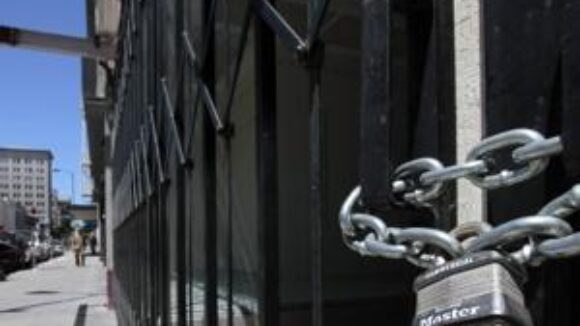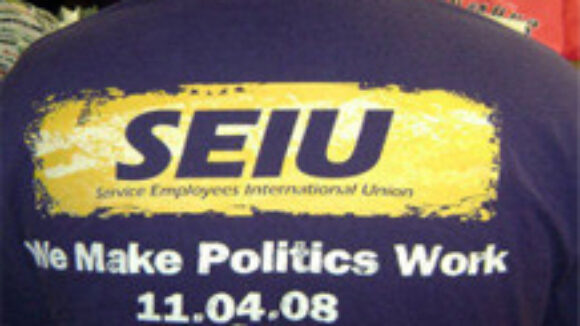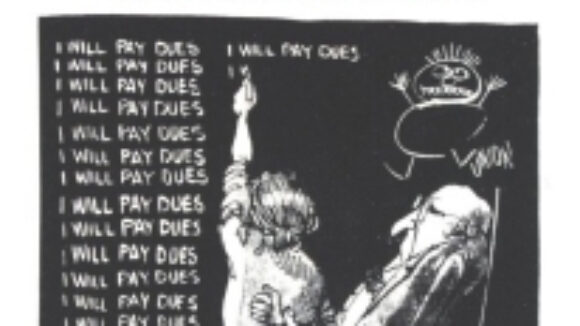As California Goes....
It’s a common refrain — As California goes, so goes the nation. Unfortunately, in the case of cities like Stockton, it may be true. …

It’s a common refrain — As California goes, so goes the nation. Unfortunately, in the case of cities like Stockton, it may be true. …
Forbes Magazine examines the impact of the National Right to Work Foundation’s latest Supreme Court’s victory in Knox vs. SEIU: The Supreme Court today rejected, on First Amendment grounds, the idea that government-employee unions can charge non-members…

It’s hard to believe that the Democratic National Convention will go off without a snag. The selection of North Carolina — a Right to Work state — did not go over…

Thanks to union rules, California’s “Teacher of the Year” now has another title — “unemployed”: A California woman who was named her school district’s “Teacher of the Year” has a new title — “job seeker.” The district laid off…
You know the union bosses' spending and benefits orgy is coming to an end when liberals like Fareed Zakaria of Time Magazine recognize the dangers unfunded pensions that union activists and pro-big labor politicians have created: "A day after Governor Scott Walker won his recall election, the New York Times wrote, "The biggest political lesson from Wisconsin may be that the overwhelming dominance of money on the Republican side will continue to haunt Democrats." Democrats have drawn much the same conclusion. "You've got a handful of self-interested billionaires who are trying to leverage their money across the country," said David Axelrod, Barack Obama's senior campaign strategist. "Does that concern me? Of course that concerns me." Warren Buffett calls the costs of public-sector retirees a "time bomb." They are the single biggest threat to the U.S.'s fiscal health. If the U.S. is going to face a Greek-style crisis, it will not be at the federal level but rather with state and local governments. The numbers are staggering. In California, total pension liabilities--the money the state is legally required to pay its public-sector retirees--are 30 times its annual budget deficit. Annual pension costs rose by 2,000% from 1999 to 2009. In Illinois, they are already 15% of general revenue and growing. Ohio's pension liabilities are now 35% of the state's entire GDP.
You know the union bosses' spending and benefits orgy is coming to an end when liberals like Fareed Zakaria of Time Magazine recognize the dangers unfunded pensions that union activists and pro-big labor politicians have created: "A day after Governor Scott Walker won his recall election, the New York Times wrote, "The biggest political lesson from Wisconsin may be that the overwhelming dominance of money on the Republican side will continue to haunt Democrats." Democrats have drawn much the same conclusion. "You've got a handful of self-interested billionaires who are trying to leverage their money across the country," said David Axelrod, Barack Obama's senior campaign strategist. "Does that concern me? Of course that concerns me." Warren Buffett calls the costs of public-sector retirees a "time bomb." They are the single biggest threat to the U.S.'s fiscal health. If the U.S. is going to face a Greek-style crisis, it will not be at the federal level but rather with state and local governments. The numbers are staggering. In California, total pension liabilities--the money the state is legally required to pay its public-sector retirees--are 30 times its annual budget deficit. Annual pension costs rose by 2,000% from 1999 to 2009. In Illinois, they are already 15% of general revenue and growing. Ohio's pension liabilities are now 35% of the state's entire GDP.

The Chicago Tribune has published a remarkable editorial about the depth of coercive unionization has taken hold among government employees in the state: Across the country, union membership has plunged during the last few decades. Just 6.9 percent of the private-sector workforce is in a labor union today. Organized labor is stronger in the public sector, with unions representing 37 percent of the government workforce. And then there is Illinois. Try to find a state worker who isn't in a union. It's almost impossible. Nearly 96 percent of the state government workforce is unionized. Yes, almost everybody. Bosses, middle managers, front-line workers. Gov. Pat Quinn exacerbated the situation by cutting an election-year deal in 2010 with the American Federation of State, County and Municipal Employees. The deal guaranteed union workers would not be laid off through June 2012. That meant nonunion workers got stuck with forced furlough days, layoffs and no pay raises. In some cases, they watched the union employees who worked beneath them pass them up on the pay scale. (Recall that, as the ink was drying on this agreement, AFSCME rewarded Quinn with its election endorsement. Don't you love coincidences? Those moments when like-minded people find one another?)

National Right To Work Legal Defense Foundation attorneys lead by W. James Young fought to stop SEIU abuses of Dianne Knox and her fellow employees right not to be compelled to "subsidize a [SEIU] political effort designed to restrict their own rights." The U.S. Supreme Court 7-2 Opinion written by Justice Alito sets back another Big Labor easy political money scheme right before the 2012 elections. This decision should lead to new challenges to Big Labor's compulsory actions in the future. Two of the Justices, Breyer and Kagan, who opposed the right of individuals to voluntarily spend their own money on politics in the Citizen United case, both supported the notation that unions could compel people to unwillingly support politics that they oppose. From the Opinion: .... When a State establishes an “agency shop” that ex- acts compulsory union fees as a condition of public employment, “[t]he dissenting employee is forced to support financially an organization with whose principles and demands he may disagree.” Ellis, 466 U. S., at 455. Because a public-sector union takes many positions during collective bargaining that have powerful political and civic consequences, see Tr. of Oral Arg. 48–49, the compulsory fees constitute a form of compelled speech and association that imposes a “significant impingement on First Amendment rights.”

National Right To Work Legal Defense Foundation attorneys lead by W. James Young fought to stop SEIU abuses of Dianne Knox and her fellow employees right not to be compelled to "subsidize a [SEIU] political effort designed to restrict their own rights." The U.S. Supreme Court 7-2 Opinion written by Justice Alito sets back another Big Labor easy political money scheme right before the 2012 elections. This decision should lead to new challenges to Big Labor's compulsory actions in the future. Two of the Justices, Breyer and Kagan, who opposed the right of individuals to voluntarily spend their own money on politics in the Citizen United case, both supported the notation that unions could compel people to unwillingly support politics that they oppose. From the Opinion: .... When a State establishes an “agency shop” that ex- acts compulsory union fees as a condition of public employment, “[t]he dissenting employee is forced to support financially an organization with whose principles and demands he may disagree.” Ellis, 466 U. S., at 455. Because a public-sector union takes many positions during collective bargaining that have powerful political and civic consequences, see Tr. of Oral Arg. 48–49, the compulsory fees constitute a form of compelled speech and association that imposes a “significant impingement on First Amendment rights.”